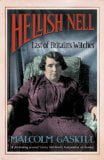 Hellish Nell: Last of Britain’s Witches
Hellish Nell: Last of Britain’s Witches
by Malcolm Gaskill
4th Estate, £15.99, ISBN 1841150192
In March 1944, Scottish working-class spiritualist Helen Duncan was tried at the Old Bailey and sentenced to nine months imprisonment under the Witchcraft Act of 1735. Duncan had given séances at which she had supposedly divulged secret military information, endangering Britain’s war effort. Malcolm Glaskill, a Fellow of Churchill College Cambridge, has made a detailed study of the woman in this strange case.
Duncan’s trial became a cause célèbre. The charge seemed absurd. In the middle of the 20th century, how could the British Establishment make itself ridiculous by charging someone with witchcraft? Duncan’s supporters felt there was a good hope that she would win her case. But Duncan’s defence counsel, spiritualist Charles Loseby, scored a spectacular own goal. He called 45 witnesses to give accounts of Duncan’s séances, in the hope of proving that she was a genuine medium. As Gaskill comments, “far from being overwhelmed, the jury were bored rigid.” Perhaps they were also appalled by the number of credulous people who had handed money over to Duncan in exchange for “supernatural” revelations. Duncan was found guilty. As she was led to the cells, she collapsed, screaming “Oh God! Is there a God? I never done it.”
This was the culmination of a strange career that Glaskill examines in intriguing detail. Living in an Edinburgh slum with a disabled husband, Duncan’s health was ruined as a result of bearing eight children, only six of whom survived childhood. Charging for séances enabled her to keep herself and her family alive. At her séances, spirits supposedly rapped out messages in Morse code, and materialised out of ectoplasm which looked suspiciously like white muslin. Glaskill’s admirably non-judgemental account of her life and career makes fascinating reading.



